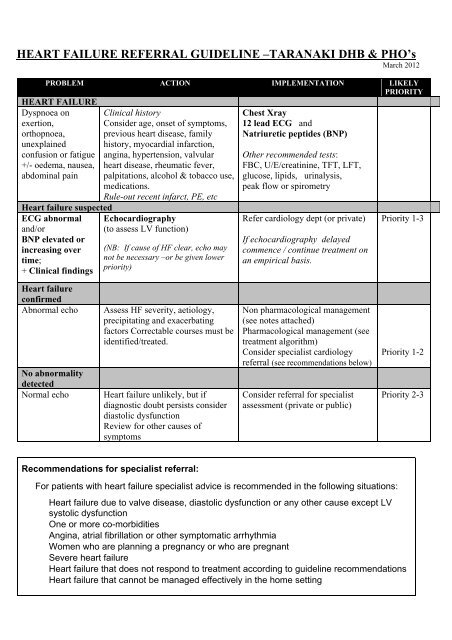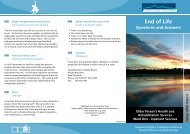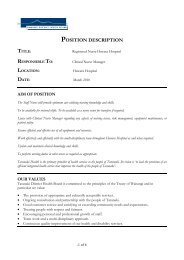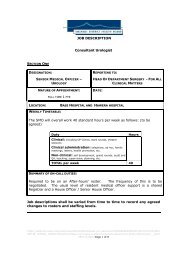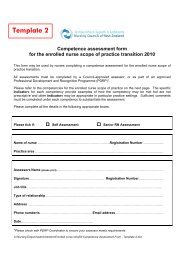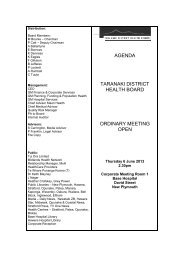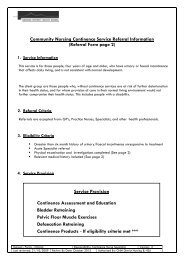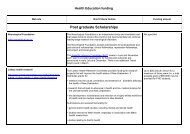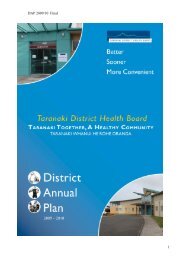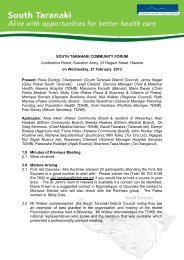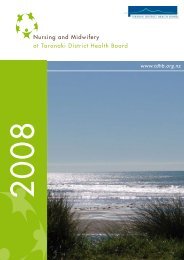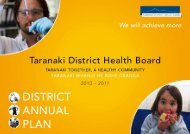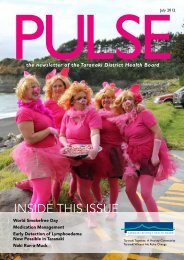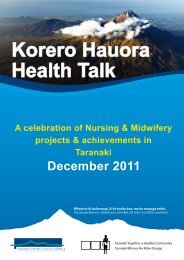HEART FAILURE REFERRAL GUIDELINE âTARANAKI DHB & PHO's
HEART FAILURE REFERRAL GUIDELINE âTARANAKI DHB & PHO's
HEART FAILURE REFERRAL GUIDELINE âTARANAKI DHB & PHO's
Create successful ePaper yourself
Turn your PDF publications into a flip-book with our unique Google optimized e-Paper software.
<strong>HEART</strong> <strong>FAILURE</strong> <strong>REFERRAL</strong> <strong>GUIDELINE</strong> –TARANAKI <strong>DHB</strong> & PHO’s<br />
March 2012<br />
PROBLEM ACTION IMPLEMENTATION LIKELY<br />
PRIORITY<br />
<strong>HEART</strong> <strong>FAILURE</strong><br />
Dyspnoea on<br />
exertion,<br />
orthopnoea,<br />
unexplained<br />
confusion or fatigue<br />
+/- oedema, nausea,<br />
abdominal pain<br />
Heart failure suspected<br />
ECG abnormal<br />
and/or<br />
BNP elevated or<br />
increasing over<br />
time;<br />
+ Clinical findings<br />
Clinical history<br />
Consider age, onset of symptoms,<br />
previous heart disease, family<br />
history, myocardial infarction,<br />
angina, hypertension, valvular<br />
heart disease, rheumatic fever,<br />
palpitations, alcohol & tobacco use,<br />
medications.<br />
Rule-out recent infarct, PE, etc<br />
Echocardiography<br />
(to assess LV function)<br />
(NB: If cause of HF clear, echo may<br />
not be necessary –or be given lower<br />
priority)<br />
Chest Xray<br />
12 lead ECG and<br />
Natriuretic peptides (BNP)<br />
Other recommended tests:<br />
FBC, U/E/creatinine, TFT, LFT,<br />
glucose, lipids, urinalysis,<br />
peak flow or spirometry<br />
Refer cardiology dept (or private)<br />
If echocardiography delayed<br />
commence / continue treatment on<br />
an empirical basis.<br />
Priority 1-3<br />
Heart failure<br />
confirmed<br />
Abnormal echo<br />
No abnormality<br />
detected<br />
Normal echo<br />
Assess HF severity, aetiology,<br />
precipitating and exacerbating<br />
factors Correctable courses must be<br />
identified/treated.<br />
Heart failure unlikely, but if<br />
diagnostic doubt persists consider<br />
diastolic dysfunction<br />
Review for other causes of<br />
symptoms<br />
Non pharmacological management<br />
(see notes attached)<br />
Pharmacological management (see<br />
treatment algorithm)<br />
Consider specialist cardiology<br />
referral (see recommendations below)<br />
Consider referral for specialist<br />
assessment (private or public)<br />
Priority 1-2<br />
Priority 2-3<br />
Recommendations for specialist referral:<br />
For patients with heart failure specialist advice is recommended in the following situations:<br />
Heart failure due to valve disease, diastolic dysfunction or any other cause except LV<br />
systolic dysfunction<br />
One or more co-morbidities<br />
Angina, atrial fibrillation or other symptomatic arrhythmia<br />
Women who are planning a pregnancy or who are pregnant<br />
Severe heart failure<br />
Heart failure that does not respond to treatment according to guideline recommendations<br />
Heart failure that cannot be managed effectively in the home setting
Treatment algorithm of symptomatic heart failure<br />
General Practitioner<br />
New Diagnosis<br />
Add Diuretic<br />
Diuretic therapy is<br />
likely to be<br />
required to control<br />
congestive<br />
symptoms and<br />
fluid retention.<br />
Start ACE<br />
inhibitor and<br />
titrate upwards<br />
Or if ACE inhibitor not<br />
tolerated (eg due to<br />
severe cough) Consider<br />
angiotensin-II receptor<br />
antagonist<br />
Specialist Input<br />
Add Digoxin<br />
If a patient in sinus<br />
rhythm remains<br />
symptomatic<br />
despite therapy<br />
with a diuretic<br />
ACE Inhibitor (or<br />
angiotensin-II<br />
receptor<br />
antagonist) and<br />
beta-blocker.<br />
OR if a patient is<br />
in atrial fibrillation<br />
then use as first<br />
line therapy<br />
Add beta-blocker<br />
and titrate upwards<br />
(if LV dysfunction)<br />
Add spironolactone<br />
If patient remains<br />
moderately to severely<br />
symptomatic despite<br />
optimal drug therapy<br />
listed above<br />
Monitor 6-monthly<br />
-clinical assessment<br />
-medication review<br />
-u/e/creatinine<br />
Seek specialist advice<br />
for further options<br />
Specialist<br />
Non pharmacological management<br />
General counselling (compliance issues)<br />
Record weight daily (for diuretic titration)<br />
Smoking cessation programmes where necessary<br />
Exercise programmes<br />
Diet, particularly low-salt<br />
Limit alcohol intake<br />
References<br />
Management of Chronic Heart Failure. NZ Guideline Group (NZGG) 2001<br />
Chronic heart failure: Management of chronic heart failure in adults in primary and secondary care. National Institute for<br />
Clinical Excellence (NICE) UK ) October 2003<br />
Assessment and management of cardiovascular risk. NZ Guidelines Group, (NZGG), December 2003<br />
Cardiac rehabilitation, New Zealand Guidelines Group (NZGG) August 2002


